American English Vocabulary - Letter
M
The words on this page came from the VOA, Voice of
America, Special English Word Book.
Use the Fun Easy English
dictionary
for a more detailed explanation of each word. |
-
machine - n. a device with moving parts used
to do work
-
magazine - n. a publication of news, stories,
pictures or other information
- mail
- n. letters, papers and other things sent through
an official system, such as a post office
- main
- ad. the most important or largest
- major
- ad. great in size, importance or amount
-
majority - n. the greater number; more than
half
- make
- v. to produce; to create; to build; to do
something or to carry out an action; to cause to be
or to become
- male
- n. a man or boy; the sex that is the father of
children; ad. of or about men
- man
- n. an adult male human
-
manufacture - v. to make goods in large
amounts
- many
- ad. a large number or amount of
- map
- n. a picture of the earth's surface or a part of
it
- march
- v. to walk in a group like soldiers; to walk
together in a large group to protest about something
- mark
- v. to make a sign or cut on something
- market
- n. a place or area where goods are sold, bought or
traded; an economic system in which the prices of
things are decided by how many there are and how
much money people are willing to pay for them
- marry
- v. to join a man and woman together as husband and
wife; to become husband and wife (usually in a
religious or civil ceremony)
- mass
- n. an amount of matter having no special form and
usually of a large size
- mate
- v. to bring together a male and a female to create
another creature
-
material - n. the substance, substances or
matter of which something is made or from which
something can be made, such as wood, cloth or stone;
anything that can be made into something else
-
mathematics - n. the science dealing with
amounts, sizes and shapes, as explained by numbers
and signs
- matter
- n. anything that can be seen or felt; what things
are made of
- may
- v. a word used with an action word to mean permit
or possible ("May I go?" "They may leave tomorrow.")
- mayor
- n. the chief official of a city or town government
- meal
- n. food eaten to satisfy hunger, such as dinner
- mean
- v. to want to; to give the idea of; to have the
idea of
-
measure - v. to learn the amount, size or
distance of something; n. an action taken; a
legislative proposal
- meat
- n. the part of a dead animal used for food
- media
- n. all public information organizations, including
newspapers, television and radio
-
medicine - n. a substance or drug used to
treat disease or pain; the science or study of
treating and curing disease or improving health
- meet
- v. to come together with someone or something at
the same time and place
- melt
- v. to make a solid into a liquid by heating it
- member
- n. one of a group
-
memorial - n. something done or made to honor
the memory of a person or event
- memory
- n. a picture in the mind of past events; the
ability to remember; a thing remembered
- mental
- ad. about or having to do with the mind
-
message - n. written or spoken news or
information; a note from one person to another
person or group
- metal
- n. a hard substance such as iron, steel or gold
- method
- n. the way something is done
-
microscope - n. a device used to make very
small things look larger so they can be studied
- middle
- n. the center; a place or time of equal distance
from both sides or ends; ad. in the center
-
militant - n. someone active in trying to
cause political change, often by the use of force or
violence
-
military - n. the armed forces of a nation or
group; ad. of or about the armed forces
-
militia - n. an army of citizens instead of
professional soldiers; an armed force or private
army
- milk
- n. the white liquid produced by female animals to
feed their young
- mind
- n. the thinking, feeling part of a person
- mine
- v. to dig useful or valuable substances out of the
earth; n. a place in the earth where such substances
are found; a bomb placed under the ground or under
water so it cannot be seen
-
mineral - n. a substance found in nature that
is not an animal or a plant, such as coal or salt
-
minister - n. a member of a cabinet; a high
government official ("prime minister,"foreign
minister")
- minor
- ad. small in size; of little importance
-
minority - n. the smaller number; opposite
majority
- minute
- n. a measure of time; one of the sixty equal parts
of an hour; sixty seconds
- miss
- v. to fail to hit, see, reach or meet
-
missile - n. any weapon that can be thrown or
fired through the air and explodes when it reaches
its target
-
missing - ad. lost; not found
-
mistake - n. a wrong action or decision; an
action done without the knowledge that it was wrong
- mix
- v. to put different things together to make one
thing
- mob
- n. a large group of wild or angry people
- model
- n. an example; something, usually small, made to
show how something will look or work
-
moderate - ad. not extreme
- modern
- ad. of the present or very recent time; the most
improved
- money
- n. pieces of metal or paper used to pay for things
- month
- n. one of the twelve periods of time into which a
year is divided
- moon
- n. the bright object often seen in the night sky
that orbits the earth about every twenty-nine days
- moral
- ad. concerning what is right or wrong in someone's
actions
- more
- ad. greater in size or amount
-
morning - n. the early part of the day, from
sunrise until noon
- most
- ad. greatest in size or amount
- mother
- n. the female parent; a woman who has a child or
children
- motion
- n. a movement; a continuing change of position or
place
-
mountain - n. a part of the earth's surface
that rises high above the area around it
- mourn
- v. to express or feel sadness
- move
- v. to change position; to put or keep in motion;
to go
-
movement - n. the act of moving or a way of
moving; a series of acts or efforts to reach a goal
- movie
- n. a motion picture; a film
- much
- ad. great in amount
- murder
- v. to kill another person illegally; n. the crime
of killing another person
- music
- n. the making of sounds by singing or using a
musical instrument
- must
- v. a word used with an action word to mean
necessary ("You must go to school.")
-
mystery - n. something that is not or cannot
be explained or understood; a secret
|
|
|
Additional Lessons |
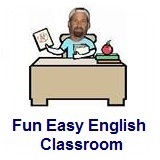 About These
Lessons About These
Lessons
The following classroom lessons are great for students
who want additional listening and reading practice. |
-
Travel America -
Beginner
Level. Do you love America and American
English? Learn before you travel. Facts and other
cool stuff about your favorite U.S. state. Great
English reading practice.
|
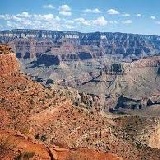 Travel
America - Maryland Travel
America - Maryland
(Beginner -
Reading)
Learn some interesting facts and read interesting
stories about Maryland. |
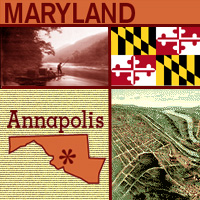 Maryland Maryland
One of the original 13 states to join the Union (in
1788), Maryland is in the middle of the Eastern
Seaboard. It's believed that Lord Baltimore, who
received a charter for the land in 1632, named the
state after Queen Henrietta Maria, wife of King
Charles I. The Mason and Dixon line was drawn in the
1760s to settle a dispute between the Penn and
Calvert families. In addition to marking the
boundary between Pennsylvania and Maryland, it is
the traditional boundary between the North and the
South. Maryland is known as the "Free State"; its
flower is the black-eyed susan; and its capital is
Annapolis, home of the U.S. Naval Academy. |
Maryland
State Flag
The state flag of Maryland was officially adopted in
1904.
The Maryland flag bears the arms of the Calvert and
Crossland families (also seen on Maryland's state seal).
Calvert was the family name of the Lords Baltimore who
founded Maryland, and their colors of gold and black appear
in the first and fourth quarters of the flag (and on several
of Maryland's state symbols; the state flower, state bird,
state insect, and even the state cat).
Crossland was the family of the mother of George Calvert,
first Lord Baltimore. The red and white Crossland colors,
with a cross bottony, appear in the second and third
quarters. The flag was first flown on October 11, 1880 in
Baltimore at a parade marking the 150th anniversary of the
founding of Baltimore. It was also flown on October 25,
1888, at the Gettysburg Battlefield for ceremonies
dedicating monuments to Maryland regiments of the Army of
the Potomac. |
|
Source:
State Symbols USA |
|
|
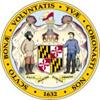 Maryland
State Facts Maryland
State Facts
Picture: state seal of Maryland |
|
State Capital |
Annapolis |
|
Nickname |
Old Line State / Free State |
|
Motto |
Fatti Maschii Parole Femine (Manly deeds, womanly
words) |
|
Statehood |
April 28, 1788 (7th) |
|
Origin of Name |
Named to honor Henrietta Maria, wife of England's
King Charles I. |
|
Largest Cities |
Baltimore, Columbia, Silver Spring, Dundalk,
Wheaton-Glenmont, Ellicott City |
|
Border States |
Delaware, Pennsylvania, Virginia, West Virginia |
|
Area |
9,775 sq. mi., 42nd largest |
|
State Bird |
Baltimore Oriole |
|
State Flower |
Black-Eyed Susan (rudbeckia hirta) |
|
State Tree |
White Oak |
|
State Song |
Maryland, My Maryland |
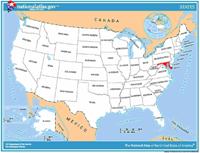 Travel and tourism site
for Maryland - This state travel and territorial
tourism site provides ideas for your vacations, meetings, and more. Travel and tourism site
for Maryland - This state travel and territorial
tourism site provides ideas for your vacations, meetings, and more. |
|
|
Maryland Stories |
|
|
St. Mary's Oyster Festival
Have you ever heard of oyster-shucking?
To shuck an oyster you open its shell and detach the
oyster inside. Every October, the St. Mary's Oyster
Festival in Leonardtown, Maryland, celebrates the
opening of the oyster season on the Chesapeake Bay.
The festival also recognizes the life of the people
who work the waters for a living.
More than 150,000 oysters are eaten during the
two-day festival. Shuckers use a special knife to do
the job, and one of the events at the Festival is
the National Oyster Shucking Championship Contest.
People come from all over the country to see who can
shuck two-dozen oysters the quickest and the best.
Some past winners from this event have gone on to
compete in the International Oyster Festival in
Galway, Ireland. Many people like their oysters raw,
but for those who prefer them cooked, there is a
National Oyster Cook-Off. |
|
|
Montgomery County
Agricultural Center / Fair
How much do you know about farm life? If your county
or state has a fair, you can learn a lot about it
there.
A 1940s project to get young people involved in
agriculture and homemaking skills turned into one of
the largest county fairs on the East Coast -- and it
was started by kids. The first Montgomery County
Agricultural Fair began as a one-day livestock show
in 1949, sponsored by the county's 4-H Club, an
organization for young people interested in farming.
The fair was a way for farmers to show their best
farm animals to each other and to get youth excited
about farming, gardening, and homemaking skills such
as preserving foods.
Over the years, the fair has become a way to get a
peek into farm life, as fewer people are involved in
farming. The Agricultural Center is a cluster of
buildings built for the fair that are used all year
long to host shows, exhibitions, and meetings.
Today, the Montgomery County Agricultural Fair has
grown into a weeklong event, involving more than
2,000 volunteers. |
|
|
Benjamin Banneker Historical
Park & Museum
Do you know who Benjamin Banneker was and what he
did?
Benjamin Banneker was a self-educated scientist at a
time when most African Americans were slaves. Born a
free black man in the British Colony of Maryland in
1731, he received some formal education, but he
mostly borrowed books and taught himself science and
mathematics. At 22, he borrowed a pocket watch, and
without any training, figured out how to carve a
working wooden clock that chimed each hour. Because
of this clock, he became well known and people would
visit him just to see his creation.
Banneker ran his family farm for many years, but
when he was in his late 50s, a neighbor's son lent
him a telescope. He became interested in astronomy,
the study of the planets and stars, and again taught
himself a new science. He made calculations of
tides, sunrises and sunsets, and even predicted an
eclipse. For several years he published an almanac
of these calculations. Today, he is best known for
publishing six almanacs, called "Benjamin Banneker's
Almanac," between 1792 and 1797.
In the 1790s, Banneker also helped survey and lay
out the land for Washington, D.C., which became the
nation's capital. For a look at Banneker's amazing
life, visit the Benjamin Banneker Historical Park &
Museum in Ellicott, City, Maryland. |
|
|
Chestertown Tea Party
Festival
Most people have heard of the Boston Tea Party, but
did you know that Maryland had a similar "tea
party?"
In 1773, the British Parliament passed the Tea Act,
which taxed tea and restricted who was allowed to
import tea into the American Colonies. Bostonians
protested by boarding three ships in the night
disguised as Native Americans and dumping the
British tea into Boston Harbor. This famous protest
became known as the Boston Tea Party. The British
responded by closing the Port of Boston until the
Colonists paid for the destroyed tea.
This angered many people in the other Colonies, and
in Chestertown, Maryland, the citizens protested by
deciding not to buy, sell, or drink British tea.
Then, in May 1774, they boarded a British ship
loaded with a cargo of tea and threw it into the
Chester River. Unlike the Tea Party in Boston, the
citizens of Chestertown made no attempt to disguise
themselves and acted in broad daylight. Every May,
the Chestertown Tea Party Festival is the site of a
celebration remembering those brave citizens.
There's a parade, a 10-mile run, Colonial crafts
demonstrations, and of course, a re-enactment of the
historic Chestertown Tea Party! |
|
|
Cracking Crabs in Maryland
Do you know what a "jimmy" is?
Jimmies, callinectes sapidus, beautiful swimmers,
channelers, sooks, and she-crabs -- are all names
for the blue crab, a crustacean found in the
Chesapeake Bay. The Chesapeake Bay is a large bay on
the Atlantic coast of the United States. It has
played an important role in the history and culture
of the state of Maryland.
Chesapeake Bay fishermen, or watermen, have
harvested the waters for crabs, oysters, clams, and
fish for many generations. They work in skipjacks, a
name for workboats or fishing boats. Commercial
fishing was a huge industry in Maryland, but
pollution has caused a decrease in the population of
the bay's marine life. Consequently, many watermen
struggle to maintain their way of life.
Nevertheless, Marylanders love their crab and eat
them by the bushel at crab houses. These restaurants
cover their tables with brown paper, unload a bushel
of crabs on the table and provide knives and mallets
for customers to pry the crabs open. Have you ever
eaten a crab? |
|
|
The Carroll County Ghost Walk
Does your town play host to any ghosts?
Every year the Public Library of Carroll County,
Maryland, is a ghost host! Since the early 1980s,
the library has held the Carroll County Ghost Walk.
At this event, visitors come to the library and
learn about local ghost legends and sightings.
Afterward, they head out into the streets to tour
the town of Westminster and see the spooky spots for
themselves. Is Westminster really haunted? Some
people think so. In fact, Cockey's Tavern in
Westminster is said to have its own ghost -- a
confederate soldier who was wounded in the Battle of
Gettysburg. Stories say that he likes to help
himself at the bar, rearrange pictures on the wall,
and, in general, be a troublemaker.
Over the years many strange and unexplained
sightings have taken place in many other places in
Carroll County. Come to the Carroll County Ghost
Walk and see for yourself! |
|
|
Historic Takoma Park and
Takoma Park Elementary School
You probably know someone who works in a city but
doesn't live there. Today that's common. But before
most people owned cars and most cities had bus
systems, people needed to live as close to work as
possible.
That all changed in the late 1800s, when railroads
were built from cities to outlying areas, allowing
people to work in one place and live in another.
People would work in the city and, at the end of the
day, take the train to their homes in the suburbs,
where it was quieter and less crowded. The suburbs
also often offered cheaper housing.
Takoma Park, Maryland, began in 1883 as a "railroad
suburb" of Washington, D.C., our nation's capital.
Nowadays, many people commute from their homes in
the suburbs to their jobs in the cities in cars
rather than trains, but lots of people still rely on
public transportation. Today, thousands of Takoma
Park residents commute to Washington using the
subway, which is a kind of railroad. So, more than
100 years after its founding, Takoma Park is still
considered a railroad suburb. |
|
Source:
Library of Congress |
|
 National Monuments of Maryland National Monuments of Maryland
The following is a description of national monuments in the state
of Maryland. There are no national forests
or parks in this state. If you plan to visit or live in
Maryland for awhile then you should
definitely plan to visit some of these
fantastic places. |
|
|
|
National Monuments |
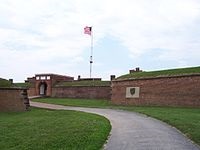 Fort
McHenry Fort
McHenry
The only place designated a national
monument and historic shrine, Fort McHenry
is a star-shaped fort best known for its
role in the War of 1812 when it successfully
defended Baltimore Harbor from an attack by
the British navy. It inspired Francis Scott
Key to write "The Star-Spangled Banner". |
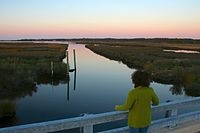 Harriet
Tubman Underground Railroad Harriet
Tubman Underground Railroad
Harriet Tubman was a famed conductor on the
Underground Railroad, leading dozens of
slaves to freedom. This monument includes
sites relating to Tubman's life, including
the slave-built Stewart’s Canal and the home
of Jacob Jackson. The areas within the
national monument that are managed by the
NPS have been additionally designated as a
National Historical Park (NHP), and are
managed by the NPS with reference to the
authorities of the NHP legislation. |
|
|
|
 Travel
America Travel
America
Do you love America and American English? Learn before
you travel. Facts and other cool stuff about your
favorite U.S. state. Visit the Fun Easy English Travel
America pages. Read about the beautiful National
Forests, Parks, and Monuments. Great English reading practice. |
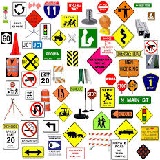 Drive America Drive America
Planning to drive in America? Learn the rules and
regulations. Great English reading practice. |
|